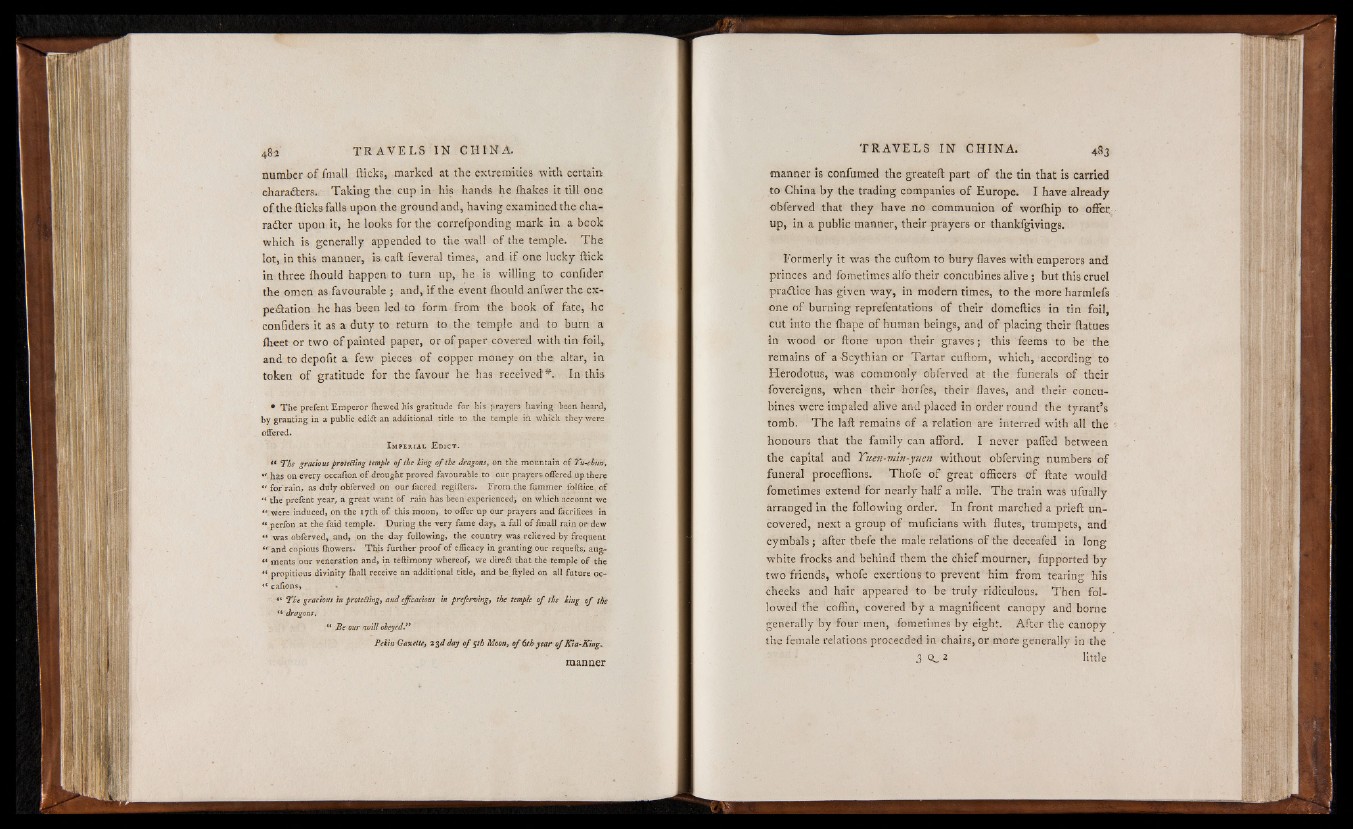
number o f imall flicks, marked at the extremities with certain
characters.. Taking the cup in his hands he fliakes it till one
o f the flicks falls upon the ground and, having examined the character
upon it, he looks for the correfponding mark in a bcok
which is generally appended to the wall o f the temple; The
lot, in this manner, is caft feveral times, and if one lucky flick
in three fhould happen to turn up, he is willing to confider
the omen as favourable ; and, if the event ihould anfwer the expectation
he has been led to form from the book o f fate, lie
conftders it as a duty to return to the temple and to burn a
ibeet or two o f painted paper, or o f paper covered with tin foil,
and to depofit a few pieces o f copper money on the altar, in
token o f gratitude for the favour he has received1*. In this
• The prefent Emperor Ihewed his gratitude for his prayers having been heard,
by granting in a public edidt an additional title to the temple in which they were
offered. Imperial Edict.
The gracious protesting temple of the king of the dragons, on the mountain o f Tu-chun>
has on every occaiion o f drought proved favourable to our prayers-offered up there
u for rain, as duly obferved on our facred regifters. From the fiimmer folftice, of
“ '•the prefent year, a great want o f rain has been experienced1, on which account we
“ were induced, on the 17th o f this moon, to offer up our prayers and facrifices in
* perfon at the faid temple. During the very fame day, a fall o f fmall rain or dew
“ was obferved, and, on the day following, the country was relieved by frequent
“ and copious ihowers. This further proof of efficacy in granting our requefts; aug-
“ merits our veneration and, in teftimony whereof, we direit that the temple o f the
“ propitious divinity ihall receive an additional title, and be ilyled on all future oc-
«* cafions» *
The gracious in protesting, and efficacious in preferving, the temple of the king o f the
u dragons,
u Be our will obeyed,n
Pekin Gazette, 23d day of $tb Moon, of 6th year of Kia-King.
manner
manner is confumed the greateft part o f the tin that is carried
to China by the trading companies o f Europe. I have already
obferved that they have no communion of worlhip to offer,
up, in a public manner, their prayers or thankfgivings.
Formerly it was the cuftom to bury flaves with emperors and
princes and fometimes alfo their concubines a liv e ; but this cruel
practice has given way, in modern times, to the more harmlefs
one o f burning reprefentations o f their domeftics in tin foil,
cut into the fhape o f human beings, and o f placing their ftatues
in wood or ftone upon their graves; this feems to be the
remains o f a Scythian or Tartar cuftom, which, according to
Herodotus, was commonly obferved at the funerals o f their
fovereigns, when their horfes, their flaves, and their concubines
were impaled alive and placed in order round the tyrant’s
tomb. The laft remains o f a relation are interred with all the
honours that the family can afford. I never paffed between
the capital and Yuen-min-yuen without obferving numbers o f
funeral proceffions. Thofe o f great officers o f ftate would
fometimes extend for nearly half a mile. The train was ufually
arranged in the following order. In front marched a prieft uncovered,
next a group o f muficians with flutes, trumpets, and
cymbals; after thefe the male relations o f the deceafed in long
white frocks and behind them the chief mourner, fupported by
two friends, whofe exertions to prevent him from tearing his
cheeks and haiir appeared to be truly ridiculous. Then followed
the coffin, covered by a magnificent canopy and borne
generally by four men, fometimes by eight. After the canopy
the female relations proceeded in chairs, or more generally in the
3 0- 2 little